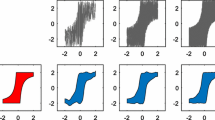Abstract
This paper summarizes the parameter estimation of systems with set-valued signals, which can be classified to three catalogs: one-time completed algorithms, iterative methods and recursive algorithms. For one-time completed algorithms, empirical measure method is one of the earliest methods to estimate parameters by using set-valued signals, which has been applied to the adaptive tracking of periodic target signals. The iterative methods seek numerical solutions of the maximum likelihood estimation, which have been applied to both complex diseases diagnosis and radar target recognition. The recursive algorithms are constructed via stochastic approximation and stochastic gradient methods, which have been applied to adaptive tracking of non-periodic signals.
Similar content being viewed by others
References
Bi, W.J., Kang, G.L., Zhao, Y.L., et al. SVSI: fast and powerful set-valued system identification approach to identifying rare variants in sequencing studies for ordered categorical traits. Annals of Human Genetics, 79(4): 294–309 (2015)
Bourgois, L., Juillard, J. Convergence analysis of an online approach to parameter estimation problems based on binary noisy observations. Automatica, 48(11): 2837–2842 (2012)
Bradfield, J.P., Taal, H.R., Timpson, N.J., et al. A genome-wide association meta-analysis identifies new childhood obesity loci. Nature Genetics, 44(5): 526–531 (2012)
Brailsford, A.D., Yussouff, M., Logothetis, E.M. Theory of gas sensors. Sensors and Actuators B Chemical, 13(1): 135–138 (1993)
Fang, J., Li, H. Distributed adaptive quantization for wireless sensor networks: From delta modulation to maximum likelihood. IEEE Transactions on Signal Processing, 56(10): 5246–5257 (2008)
Florez, J. C. A genome-wide association study of treated A1C. Diabetes, 59(2): 332–334 (2010)
Godoy, B.I., Goodwin, G.C., Agüero, J.C., Marelli, D., Wigren, T. On identification of FIR systems having quantized output data. Aotomatica, 47(9): 1905–1915 (2011)
Guo, J., Zhang, J.F., Zhao, Y.L. Adaptive tracking control of a class of first-oder systems with binary-valued observations and fixed thresholds. Journal of Systems Science and Complexity, 5(6): 1041–1051 (2012)
Guo, J., Zhang, J.F., Zhao, Y.L. Adaptive tracking control of a class of first-oder systems with binary-valued observations and time-varying thresholds. IEEE Transactions on Automatic Control, 56(12): 2991–2996 (2011)
Guo, J., Zhao, Y.L. Identification of the gain system with quantized observations and bounded persistent excitations. Science China Information Sciences, 57(1): 012205:1–012205: 15 (2014)
Guo, J., Zhao, Y.L. Recursive projection algorithm on FIR system identification with binary-valued observations. Automatica, 49(11): 3396–3401 (2013)
Jafari, K., Juillard, J., Colinet, E. A recursive system identification method based on binary measurements. In: Proceedings of 49th IEEE Conference on Decision and Control, Atlanta, 2010: 1154–1158
Kang, G.L., Bi, W.J., Zhao, Y.L., et al. A new system identification approach to identify genetic variants in sequencing studies for a binary phenotype. Human Heredity, 78(2): 104–116 (2014)
Knott, E.F., Shaeffer, J.F., Tuley, M.T. Radar Cross Section, 2nd ed. SciTech Publishing Inc, Raleigh, 2004
Li, J., Alregib, G. Rate-constrained distributed estimation in wireless sensor networks. IEEE Transactions on Signal Processing, 55(5): 1634–1643 (2007)
Song, Q.J. Recursive identification of systems with binary-valued outputs and with ARMA noises. Automatica, 93: 106–113 (2018)
Wang, L.Y., Yin, G.G. Asymptotically efficient parameter estimation using quantized output observations. Automatica, 43(7): 1178–1191 (2007)
Wang, L.Y., Yin, G.G., Zhang, J.F., Zhao, Y.L. System identification with quantized observations. MA: Birkhauser, Boston, 2010
Wang, L.Y., Zhang, J.F., Yin, G.G. System identification using binary sensors. IEEE Transactions on Automatic Control, 48(11): 1892–1907 (2003)
Wang, T., Bi, W.J., Zhao, Y.L., Xue, W.C. Radar target recognition algorithm based on RCS observation sequence—set-valued identification method. Journal of Systems Science and Complexity, 29(3): 1–16 (2016)
Wang, T., Tan, J.W., Zhao, Y.L. Asymptotically efficient non-truncated identification for FIR systems with binary-valued outputs. Science China Information Sciences, doi: 10.1007/sll432-018-9646-7 (2018)
You, K.Y. Recursive algorithms for parameter estimation with adaptive quantizer. Automatica, 52: 192–201 (2015)
Zhang, H., Wang, T., Zhao, Y.L. Asymptotically Efficient Recursive Identification of FIR Systems with Binary Observations. IEEE Transactions on Systems, Man and Cybernetics: Systems, submitted.
Zhao, Y.L., Bi, W.J., Wang, T. Iterative parameter estimate with batched binary-valued observations. Science China Information Sciences, 59(5): 1–18 (2016)
Zhao, Y.L., Guo, J., Zhang, J.F. Adaptive tracking control of linear systems with binary-valued observations and periodic target. Automatica, 58(5): 1293–1298 (2013)
Zhao, Y.L., Wang, L.Y., Yin, G.G., Zhang, J.F. Identification of Wiener systems with binary-valued output observations. Automatica, 43: 1752–1765 (2007)
Zhao, Y.L., Zhang, J.F., Wang, L.Y., Yin, G. Identification of Hammerstein systems with quantized observations. SIAM Journal on Control and Optimization, 48(7): 4352–4376 (2010)
Author information
Authors and Affiliations
Corresponding author
Additional information
Supported by the National Natural Science Foundation of China (Nos. 61803370, 61622309), the China Postdoctoral Science Foundation (No. 2018M630216), and the National Key Research and Development Program of China (No. 2016YFB0901902).
Rights and permissions
About this article
Cite this article
Wang, T., Zhang, H. & Zhao, Yl. Parameter Estimation Based on Set-valued Signals: Theory and Application. Acta Math. Appl. Sin. Engl. Ser. 35, 255–263 (2019). https://doi.org/10.1007/s10255-019-0822-x
Received:
Revised:
Published:
Issue Date:
DOI: https://doi.org/10.1007/s10255-019-0822-x
Keywords
- set-valued signals
- parameter estimation
- one-time completed algorithms
- iterative estimation algorithms
- recursive estimation algorithms




